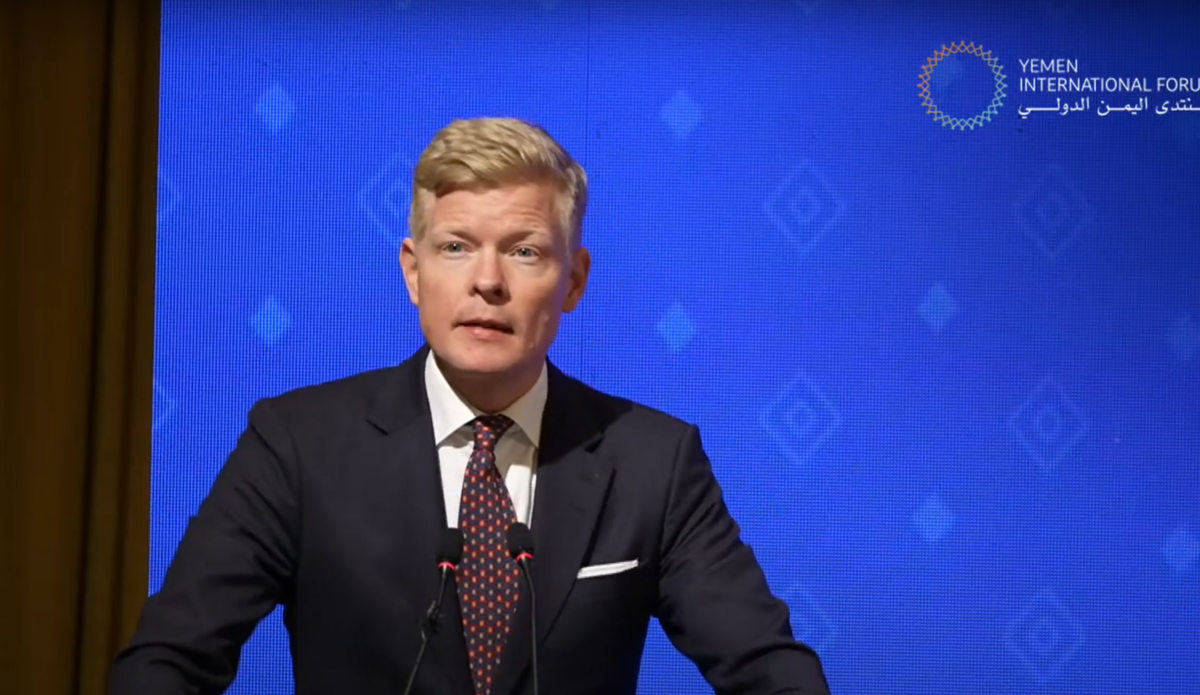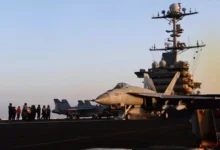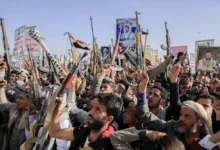Remarks by the UN Special Envoy for Yemen at the third Yemen International Forum

SMA NEWS – GENEVA
The UN Special Envoy for Yemen, Hans Grundberg, at the closing session of the third Yemen International Forum delivered remarks about the situation in the country, hereunder is his remarks:-
Excellencies, distinguished guests, colleagues, and friends,
As we conclude this third Yemen International Forum, I want to extend my deepest gratitude to all of you. While I was unfortunately unable to attend the full event, my office has engaged in the discussions, has followed the debates, and has listened closely to the different perspectives. Having participated in previous forums, I know and greatly value the energy of the exchanges and dedication and commitment this gathering represents.
My office and I consistently draw on the insights of you all—of Yemeni leaders, civil society, the private sector, and international partners— to help inform our work and actions towards a future where Yemenis can live in dignity, peace, and prosperity. You have gathered here not just as policymakers or experts, but as dedicated stakeholders in Yemen’s future. These discussions have been candid and, at times, difficult, but always necessary. But if there is one message I would like to deliver to this Forum, it is this: peace is possible, even in the most challenging times, but it demands relentless effort, unified will, and sheer determination. You will always get this from me and my colleagues.
The challenges Yemen faces today are immense; and tackling these challenges has been at the heart of your discussions. Among them, the continued degradation of civic space, particularly in areas under Ansar Allah control. The campaign of arbitrary detentions of staff from the UN, civil society, the diplomatic community, and the private sector, and the deplorable tragic death in detention of our World Food Programme colleague, highlight the growing risks and shrinking space for those working to support Yemen’s people. Such actions threaten fundamental rights, erode trust, and hinder peace efforts. These actions must end, and there must be accountability. It was therefore hugely important that the United Nations Security Council sent a strong and united message a few of days ago condemning the death of our colleague, demanding the immediate and unconditional release of all those detained, as well as reiterating its support for the UN in our efforts toward a negotiated, inclusive Yemeni led and Yemeni owned political settlement.
Ladies and gentlemen, the road ahead is not an easy one. The risk of military escalation within Yemen is increasing, threatening to deepen suffering and set back efforts towards peace. The humanitarian crisis is severe, and political divisions persist. Yet this Forum has demonstrated that there is both the expertise and determination to confront these challenges. Over the past three days, you have explored and reflected on the collective responsibilities for achieving peace and stability in Yemen, with a strong emphasis on the crucial role of transitional justice, which is Yemeni-led and designed and has the rights of victims at its core. Importantly, you have also had constructive discussions on how to address Yemen’s economic challenges, including how to overcome the technical, political and security challenges to restart the production and export of oil and gas.
Another point of animated discussion has been the impact of the US Foreign Terrorist Organization designation of Ansar Allah. There is a lot of speculation and conjecture and clarifications are currently being sought. It is important that our efforts to advance the peace process are protected. Last week, I was in Washington and in New York where my message has been clear on the need for a political process under UN auspices. Ultimately, a political process is needed to address the fundamental issues. Time and again, Yemenis from across different parts of the country identify three critical priorities: economic recovery, a nationwide ceasefire, and an inclusive political process to chart the future for the country. These were the very issues the parties committed to in the roadmap, and I believe that these elements remain valid today. Protecting the mediation space remains my priority, ensuring the parties can make meaningful progress, and that we can directly tackle the issues you have been discussing over the past three days.
To our international partners, I implore you: don’t lose sight of Yemen amid the many global crises. Your continued diplomatic, financial, and humanitarian support is vital. To Yemeni actors, I urge you to keep the doors to dialogue open and prioritise the national interest over factional divides. And to civil society and the private sector, your role is indispensable—your innovation and resilience will be the foundation for a new Yemen. As we leave this Forum, I want to thank you for your engagement, your commitment, and your hope. The road to peace may be complicated, but with our collective perseverance, I believe it is possible. I wish you safe travels, and I look forward to our continued collaboration in the months ahead.







